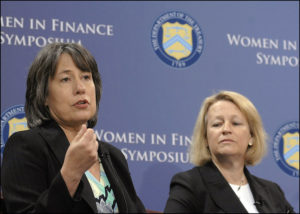
FDIC Chair Sheila Bair and SEC Chair Mary Schapiro at the Women in Finance Symposium, March 29, 2010. Photo by US Treasury Dept.
Former chair of the FDIC, Sheila Bair, calls out a murky practice in markets today, payment for order flow (PFOF), which she defines as “brokers selling their retail orders to makers of markets outside of regulated, public exchanges.” PFOF had mostly flown under the radar until it was highlighted in January during the GameStop share crisis faced by commission-free investing tool Robinhood Markets. Bair writes in the Financial Times about new scrutiny being placed on PFOF by the SEC’s Gary Gensler:
Securities and Exchange Commission chair Gary Gensler has cast a long-needed spotlight on the practice of brokers selling their retail orders to makers of markets outside of regulated, public exchanges.
Typically, these are “dark pools” — private exchanges run by large financial institutions — or “wholesalers” such as Citadel and Virtu that execute orders internally.
Critics say payment for order flow, or PFOF, represents an inherent conflict of interest, sensibly observing that brokers should be routing orders where they can get the best price for their customers, not the best deal for themselves.
Supporters argue that PFOF benefits retail investors, as market makers are required to provide prices that are better than quotes displayed by regulated exchanges. They add that broker profits from PFOF allow them to offer commission-free trading.
PFOF serves as another reminder to all regulators to scrutinise schemes purportedly benefiting the little guy
But it is far from clear whether PFOF actually reduces costs for retail investors, or simply makes their costs less transparent. By allowing market makers to attract order flow with a bribe, not a best price, PFOF gives them every incentive to hide the true price at which they are willing to trade, probably leading to poorer executions for retail traders.
Unlike market makers on public exchanges, dark pools and wholesalers are not required to publish and stand behind quotes. When they pay for an order, they have the discretion to trade against it or send it to an exchange.
While exchange market makers must improve a published price by a penny, there is no such requirement for dark pools and wholesalers, which can and do “improve” price by tiny fractions of a cent.
Thus, PFOF affords them the luxury of not having to compete on price to draw order flow, and to step in front of those who do, with minimal price improvement.
This reduces competition, but also creates disincentives for others to publicly expose their trading interest, knowing dark pools and wholesalers can so easily — and cheaply — jump ahead of them.
The relationship of PFOF to pricing quality was vividly illustrated in a recent enforcement settlement brought by the SEC against Robinhood. In that case, Robinhood explicitly agreed to accept less price improvement for its customers in return for a higher PFOF. The inferior executions given to those Robinhood customers may well have exceeded any benefit from not paying a commission.
Long ago, the UK’s Financial Services Authority wisely recognised the harm of PFOF to market quality and integrity, in effect banning it in 2012. A study conducted by the CFA Institute of UK markets found that absent PFOF, markets were more liquid and pricing improved for retail investors.
The reason is simple: when market makers have to compete on the quality of their public quotes and are rewarded with trades at those quotes, they compete more aggressively. Incentives are aligned.
Read more here.
